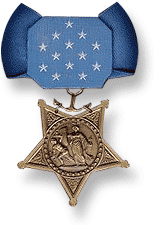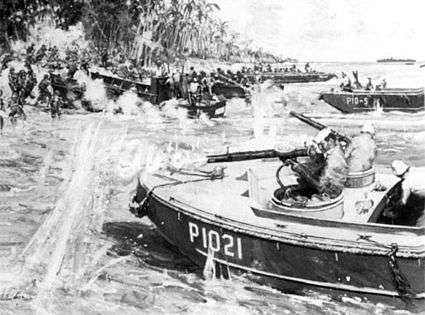Douglas Albert Munro
| Douglas Albert Munro | |
|---|---|
  | |
| Born |
October 11, 1919 Vancouver, British Columbia, Canada |
| Died |
September 27, 1942 (aged 22) Guadalcanal, Solomon Islands |
| Place of burial | Laurel Hill Memorial Park Cle Elum, Washington |
| Allegiance | United States of America |
| Service/branch |
|
| Years of service | 1939–1942 |
| Rank | Signalman First Class |
| Battles/wars |
World War II • Second Battle of the Matanikau |
| Awards |
|

Douglas Albert Munro (October 11, 1919 – September 27, 1942) is the only member of the United States Coast Guard to have received the Medal of Honor, the United States's highest military award. Munro received the decoration posthumously for his actions as officer-in-charge of a group of landing craft on September 27, 1942, during the September Matanikau action in the Guadalcanal campaign of World War II.
Biography
Munro was born on October 11, 1919, in Vancouver, British Columbia, in Canada, to James Munro, originally from California, and Edith Thrower Fairey from Liverpool, England. The Munro family (Douglas, Pat his sister elder by 2 years, and his parents) moved to Vancouver, Washington, in 1922, where his father worked as an electrician for Warren Construction Company. Douglas grew up in South Cle Elum, Washington. He was educated at South Cle Elum Grade School and graduated from Cle Elum High School in 1937. He attended Central Washington College of Education (now known as Central Washington University) for a year before leaving to enlist in the United States Coast Guard in 1939. He had an outstanding record as an enlisted man and was promoted rapidly through the ratings to a signalman, first class.[1]
In the Second Battle of the Matanikau, part of the Guadalcanal Campaign, Munro was in charge of a detachment of ten boats which landed U.S. Marines at the scene. After successfully taking them ashore, he returned his boats to their previously assigned position and almost immediately learned that conditions ashore were different from what had been anticipated and that it was necessary to evacuate the Marines immediately. Munro volunteered for the job and brought the boats to shore under heavy enemy fire, then proceeded to evacuate the men on the beach. When most of them were in the boats, complications arose in evacuating the last men, whom Munro realized would be in the greatest danger. He accordingly placed himself and his boats such that they would serve as cover for the last men to leave. Among the Marines evacuated that day was Lt. Col. Lewis B. "Chesty" Puller, USMC.[2] During this action—protecting the men after he had evacuated them—Munro was fatally wounded. He remained conscious sufficiently long only to say four words: "Did they get off?"[1]
Munro is buried at Laurel Hill Memorial Park in Cle Elum, Washington.[3]
Honors and awards
Medal of Honor
Munro's Medal of Honor is on display at the United States Coast Guard Training Center Cape May in Cape May, New Jersey. He received the Navy version of the Medal of Honor because, at the time, the Coast Guard was operating under the Department of the Navy and no separate Coast Guard version of the medal existed. A Coast Guard Medal of Honor was authorized in 1963, but has never been designed or minted.
Medal of Honor Citation:
"For extraordinary heroism and conspicuous gallantry in action above and beyond the call of duty as Officer-in-Charge of a group of Higgins boats, engaged in the evacuation of a Battalion of Marines trapped by enemy Japanese forces at Point Cruz, Guadalcanal, on September 27, 1942. After making preliminary plans for the evacuation of nearly 500 beleaguered Marines, Munro, under constant risk of his life, daringly led five of his small craft toward the shore. As he closed the beach, he signaled the others to land, and then in order to draw the enemy's fire and protect the heavily loaded boats, he valiantly placed his craft with its two small guns as a shield between the beachhead and the Japanese. When the perilous task of evacuation was nearly completed, Munro was killed by enemy fire, but his crew, two of whom were wounded, carried on until the last boat had loaded and cleared the beach. By his outstanding leadership, expert planning, and dauntless devotion to duty, he and his courageous comrades undoubtedly saved the lives of many who otherwise would have perished. He gallantly gave up his life in defense of his country."
Military awards and decorations
- Medal of Honor
- Purple Heart Medal
- Coast Guard Good Conduct Medal
- American Defense Service Medal
- American Campaign Medal
- Asiatic-Pacific Campaign Medal with one battle star
- World War II Victory Medal
| Medal of Honor | |||||
| Purple Heart Medal | Coast Guard Good Conduct Medal | American Defense Service Medal | |||
| American Campaign Medal | Asiatic-Pacific Campaign Medal | World War II Victory Medal | |||
Other honors
- Coast Guard: USCGC Munro (WHEC-724)
- Coast Guard: USCGC Munro (WMSL-755)
- Navy: USS Douglas A. Munro (DE-422)
- United States Coast Guard Training Center, Cape May, New Jersey - Munro Hall
- United States Coast Guard Academy, New London, Connecticut - Munro Hall[4]
- On July 8, 2013, Rep. Eleanor Holmes Norton introduced H
.R (An act to designate the Douglas A. Munro Coast Guard Headquarters Building (H.R. 2611; 113th Congress)) to name the new Coast Guard headquarters after Munro.[5]. 2611
See also
References
- 1 2 "SM1c Douglas A. Munro, USCG". United States Coast Guard. October 9, 2009. Retrieved November 14, 2010.
- ↑ Marines in World War II. Commemorative Series. First Offensive:The Marine Campaign For Guadalcanal. Henry I. Shaw, Jr. 1992. Marine Corps Historical Center, Building 58, Washington Navy Yard, Washington, D.C. 20374-0580 http://www.ibiblio.org/hyperwar/USMC/USMC-C-Guadalcanal/index.html Retrieved: 29 May 2014
- ↑ "Douglas Albert Munro". Claim to Fame: Medal of Honor recipients. Find a Grave. Retrieved November 14, 2010.
- ↑ "Munro Hall at U.S. Coast Guard Academy". Retrieved October 5, 2010.
- ↑ Norton, Eleanor Holmes. "THE INTRODUCTION OF A BILL TO NAME THE U.S. COAST GUARD HEADQUARTERS -- (Extensions of Remarks - July 08, 2013)". Library of Congress. Retrieved 15 July 2013.
External links
- ""Douglas Munro at Guadalcanal" by USCG historian". Retrieved September 29, 2010.
- "The Douglas Munro Story". Retrieved September 29, 2010.
- "Color Photograph at WW2inColor". Retrieved September 29, 2010.
- "Douglas Munro at Find-A-Grave". Retrieved July 10, 2012.
- "Douglas A. Munro, USCG". Retrieved July 28, 2013.